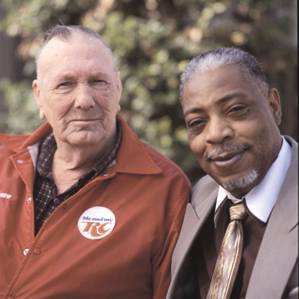|
|
The Age of Discrimination
By Abigail Trafford, The Washington Post
February 8, 2005

Tennessee 211 Image
To geriatrician Deborah Goldberg, it seemed like the perfect job: running a geriatric teaching program at a hospital in New York. She had been an internist in private practice. She was board-certified as a geriatrician. She was told that she was clearly the leading candidate. The last hurdle was an interview with the chief of medicine.
The interview was a train wreck. "He thinks I'm volunteering," says Goldberg, now 62. The man was a few years older -- in the final phase of his big job in academic medicine. Why would a 60-plus woman want to start a new job at this stage? "He said to me, 'My goodness, you're only three years younger than I am!' "
In other words, if she was almost as old as the boss, she was too old to start something new. Goldberg, who was 60 at the time, didn't fit the Young Turk image. She was too old to run a program for old people!
"I was so surprised," she recalls. When she didn't get the job and asked why, she was given vague statements such as: "Well, we wanted someone who would develop the program." As though she wouldn't be around long enough to make a significant contribution!
"Society excludes us," Goldberg says. "Most of us will be functional well into our eighties. That's 20 years" she could have had to develop the program. Or start a business or nurture students through school or learn a new skill. The life cycle has expanded to include these bonus decades of vitality for people in their sixties and seventies and beyond. Many older Americans want and need to stay in the workforce. But they run into a wall of ageism that says: "No geezers need apply."
Discrimination against older people in the workplace is pervasive, according to research by AARP. It's usually subtle and more difficult to prove than other forms of discrimination. After all, most people think the normal process in the workplace is for younger people to replace older ones. As Tom Osborne, senior attorney at AARP, explains: "You have to step back and ask: 'Is this the result of normal attrition or is this age discrimination?' "
Getting back into the job market after official retirement or a layoff is problematic. Job seekers have to cover up their age and masquerade as young. "We would advise people who are of a certain age not to put your age or graduation dates on your resume," counsels Osborne.
In this upside-down culture, what was once an asset becomes a liability. Until about age 40 or 50, experience is the steppingstone to a promotion. After that, it's viewed as excess baggage. Stereotypes kick in. In one AARP survey of public perceptions, nearly 40 percent of respondents felt that older workers aren't as effective as younger workers. Almost half believed that the majority of older people cannot adapt to change.
Prejudice becomes policy. Older workers are supposed to fade away. The Marie Antoinettes of Corporate America are saying in effect: Let them play golf.
"It's crazy," says Ronald M. Schwartz, 64, of Wakefield, R.I. Two years ago, Schwartz took an intensive course in Massachusetts and became a certified special education teacher. After a career as a freelance writer, he got a job in his new field. A year later, he was laid off because of budget cuts. Since 2003, he's been looking for a full-time job.
"Although I can bring much more to the table compared to a fresh graduate, I won't get hired," he says. There are aggressive hiring campaigns for minorities and women, he points out, "but no effort to hire old people." He still wants to teach. Meanwhile, he is tutoring students. "I've got to do something. I need the income," he says.
One of the more damaging aspects of age prejudice is that older men and women internalize the message that they don't measure up to those who are younger. Of course, there are differences between younger and older workers. Older people take longer to learn something new. At the same time, they are more stable and have a broader knowledge base. But as the worm of prejudice works its way through the psyche, older people may equate differences with inferiorities.
The culture, moreover, doesn't take kindly to angry uppity old folks. Last month an Oklahoma judge sued his colleagues for age discrimination. Marian P. Opala, 83, a justice of the Oklahoma Supreme Court, wanted to be chief justice. By custom, the job rotates among the justices. But when it came his turn, he says, his colleagues elected someone else. In his suit, he says that he "enjoys good health and sound mental acuity." Being passed over, he alleges, amounts to age discrimination in the workplace.
Legal scholars found the judge's suit unseemly, undignified, even irrational, according to news reports. In other states, judges are required to step down at a certain age. What's his beef? One article began with the condescending statement that Justice Opala is "83 years old, but he is not without ambition."
As though 80-year-olds don't have ambition!
As though they should lay aside their talents and aspirations and passions at some arbitrary age and go play shuffleboard!
As though this country doesn't have a major problem with age discrimination!
|
|



